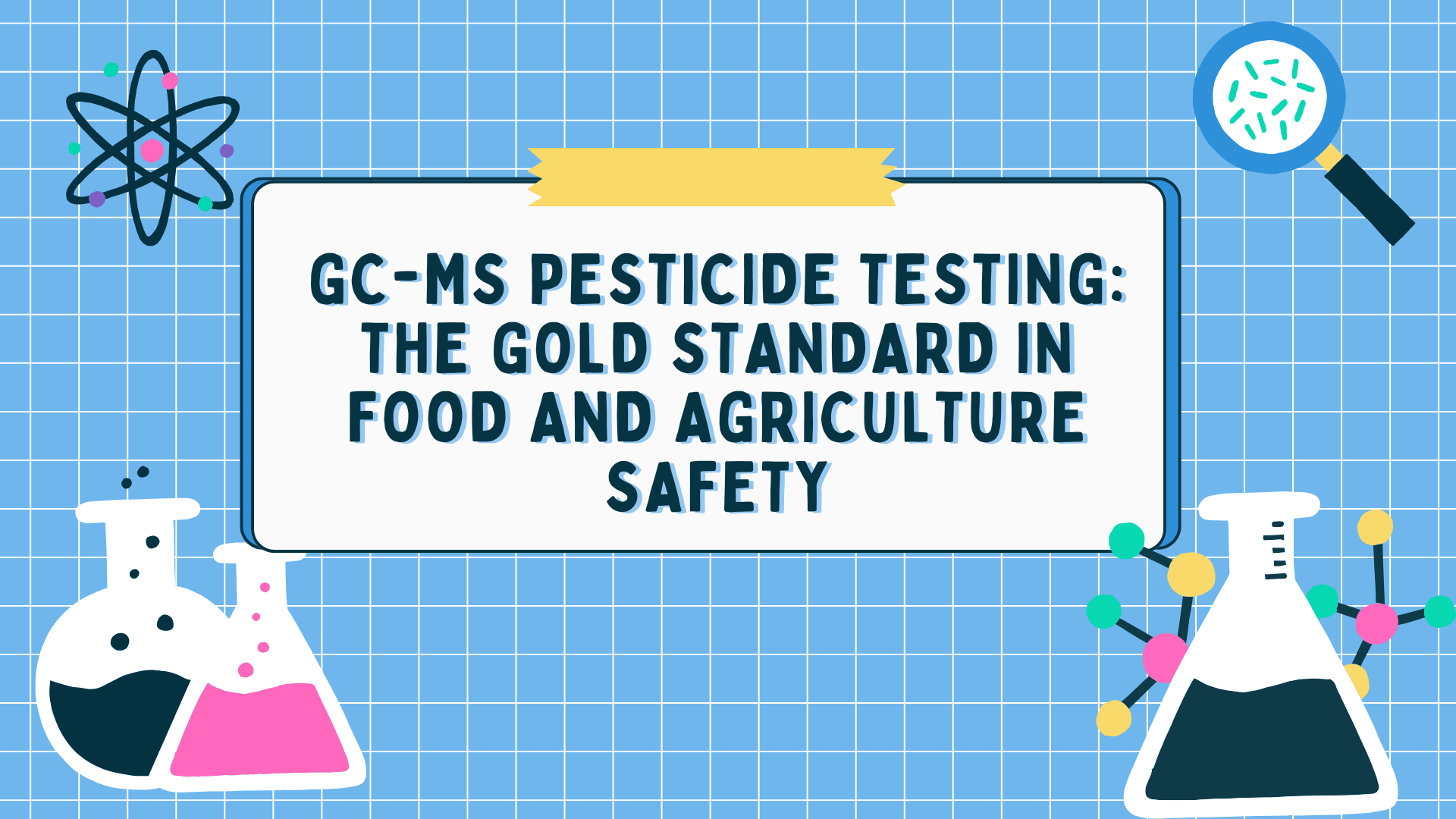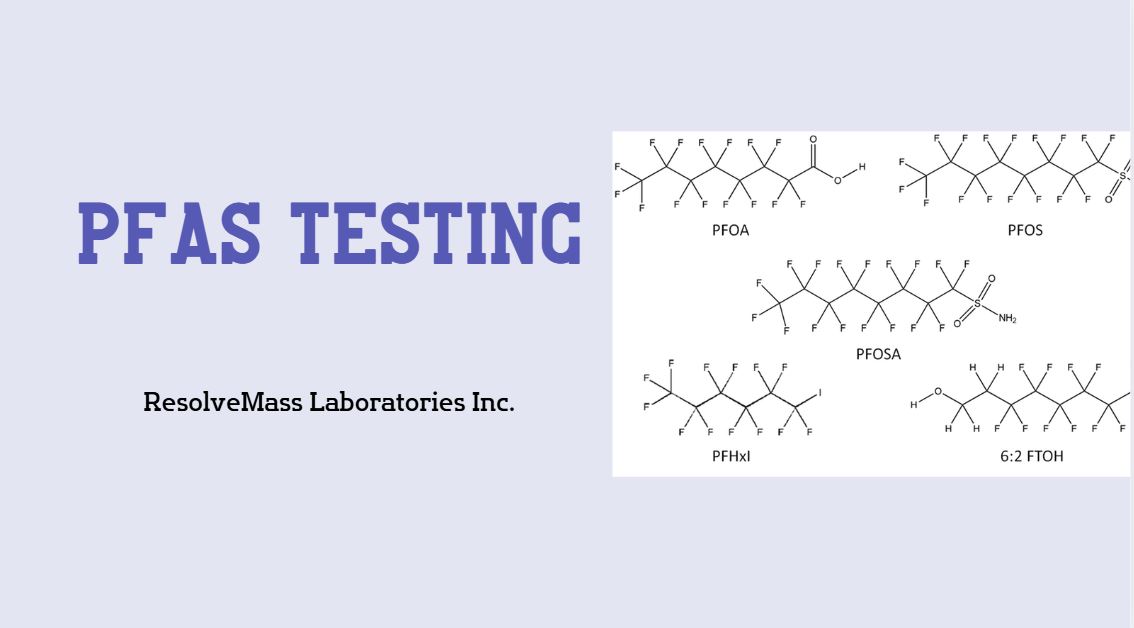Introduction
Today’s food systems demand strict safety standards and reliable testing methods. With growing consumer awareness and tight government regulations, GC-MS pesticide testing has become a critical part of ensuring food safety and compliance.
At ResolveMass Laboratories, a leading testing facility in Canada, we use Gas Chromatography-Mass Spectrometry (GC-MS) to accurately detect pesticide residues in food, water, and agricultural products. This method is known for its precision, making it the preferred choice in regulatory and commercial testing.
In this article, we’ll explain how GC-MS works, why it’s highly trusted, and how ResolveMass helps businesses stay compliant and protect consumers.
What is GC-MS Pesticide Testing?
GC-MS pesticide testing is a laboratory technique that combines two powerful tools: Gas Chromatography (GC) and Mass Spectrometry (MS). Together, they can detect and measure even the tiniest traces of pesticide residues in samples like fruits, vegetables, grains, soil, and water.
Gas Chromatography first separates the chemical components in a sample, and then Mass Spectrometry identifies each compound based on its unique characteristics. This combination allows for high-accuracy testing, even at extremely low concentration levels. It is especially useful when looking for harmful substances that may not be visible through basic tests.
Because of this high level of sensitivity and precision, GC-MS is widely used by food producers, import/export companies, and regulators around the world.
Why GC-MS is the Gold Standard for Pesticide Testing
1. High Sensitivity and Accuracy
GC-MS can detect pesticide residues in parts per trillion (ppt)—levels far below what might pose health risks. This allows early detection of contaminants and helps ensure that food products remain within safe and legal limits.
This accuracy gives peace of mind to both consumers and regulators.
2. Easier Regulatory Compliance
ResolveMass Laboratories follows strict global standards, including:
- Health Canada’s Maximum Residue Limits (MRLs)
- European Food Safety Authority (EFSA)
- U.S. FDA and EPA regulations
By using GC-MS pesticide testing, businesses can avoid compliance issues and maintain access to international markets without delays.
➡ Learn more: How to choose the right pesticide testing lab in Canada
3. Wide Range of Detection
Our GC-MS equipment can screen for more than 500 different pesticide compounds, including organophosphates, pyrethroids, and organochlorines. This makes it ideal for testing complex products with multiple ingredients or sources.
Whether it’s fresh produce or herbal extracts, GC-MS can detect both common and rare pesticides effectively.
➡ Discover our capability: Pesticide Testing Services Using GC-MS in Canada
4. Fast and Scalable Testing
ResolveMass uses automated systems and streamlined preparation techniques to deliver fast results—usually within 3 to 5 business days. For high-volume producers or urgent testing needs, we also offer expedited services.
5. Trusted Expertise
Our team of experienced chemists and food safety specialists have years of hands-on experience with GC-MS pesticide testing. With validated methods and modern equipment, we provide consistent, trustworthy results every time.
➡ Explore: Why Pesticide Testing in Food is Essential for Safety
How GC-MS Compares to Other Testing Methods
While there are other techniques for detecting pesticides, such as LC-MS/MS and HPLC, GC-MS offers unique benefits for certain types of compounds.
| Method | Best Used For | Limitations |
|---|---|---|
| GC-MS | Volatile and semi-volatile pesticides | Not suitable for highly polar compounds |
| LC-MS/MS | Non-volatile, polar pesticides | Costlier, more complex data analysis |
| HPLC | Basic screening | Lower accuracy and fewer capabilities |
GC-MS stands out for its reliability when testing thermally stable and volatile compounds.
➡ Read in depth: GC-MS-MS vs LC-MS-MS vs HPLC for Pesticide Testing
GC-MS Pesticide Testing Process at ResolveMass
At ResolveMass, we follow a detailed workflow to ensure consistent and high-quality results:
- Sample Registration & Tracking
- Sample Preparation (QuEChERS Extraction Method)
- GC-MS Analysis
- Data Review and Quality Control
- Regulatory Report Generation
Each report includes important data like LOD (Limit of Detection), LOQ (Limit of Quantification), and compliance status. This gives clients the clarity they need for internal quality checks and official submissions.
Industries That Benefit from GC-MS Testing
ResolveMass offers GC-MS pesticide testing for a variety of industries, including:
- Food & Beverage: Fruits, vegetables, juices, cereals
- Herbal Products: Supplements, CBD oils, botanicals
- Agriculture: Soil, irrigation water, crop samples
- Import/Export: Products needing MRL verification before crossing borders
These sectors rely on accurate pesticide testing to meet quality standards and avoid regulatory delays.
➡ Secure your product: Pesticide Testing Services to Ensure Product Integrity
Additional Testing Services at ResolveMass
In addition to GC-MS pesticide testing, ResolveMass offers a full suite of testing services for safety and compliance:
- Heavy Metal Testing
- Residual Solvents Analysis
- Microbiological Testing
- Mycotoxin Screening
This wide range of services supports companies in delivering safe and high-quality products.
➡ Related service: Residual Solvent Testing
Why Choose ResolveMass?
Clients choose ResolveMass Laboratories because we offer:
- Certified Laboratory Accreditation
- Scientifically Verified Methods
- Experienced Staff and Technicians
- AI-Powered Digital Reporting (LIMS)
- Complete Customer Support
Our lab’s commitment to excellence has earned the trust of businesses across Canada and around the world.
Conclusion
GC-MS pesticide testing is one of the most effective ways to ensure food safety, protect consumer health, and stay compliant with international regulations. ResolveMass Laboratories provides top-tier testing solutions backed by science, technology, and expert service.
Whether you’re a food producer, herbal manufacturer, or agricultural exporter, GC-MS testing with ResolveMass can help safeguard your products and your brand reputation.
➡ Explore our services: GC-MS Pesticide Testing Services
Need GC-MS Pesticide Testing? Contact Us Today:
FAQs
GC-MS is considered the gold standard because it offers unmatched sensitivity, precision, and reliability in detecting even the lowest levels of pesticide residues. It can handle complex food matrices and provides both qualitative and quantitative data in one run. Unlike many other methods, GC-MS minimizes false positives and delivers legally defensible results. Regulatory bodies around the world endorse it due to its consistency with global testing standards.
GC-MS is particularly effective in detecting volatile and semi-volatile pesticides, such as organochlorines, organophosphates, pyrethroids, and triazines. These pesticides are commonly used in conventional agriculture and can persist in food and soil. GC-MS allows for multi-residue screening, enabling the detection of dozens or even hundreds of pesticide compounds in one test. It is often part of a broader testing panel that ensures regulatory compliance.
By accurately identifying and quantifying pesticide residues, GC-MS helps ensure that food products meet safety standards set by national and international regulations. This protects consumers from harmful exposure and helps food producers demonstrate compliance with Maximum Residue Limits (MRLs). GC-MS also helps trace contamination sources, supporting corrective actions and better agricultural practices. Ultimately, it builds trust in the food supply chain.
While not always explicitly mandated, GC-MS is widely used to meet legal pesticide residue testing requirements in Canada, the United States, and the European Union. These countries enforce strict MRLs, and GC-MS provides the precision needed to comply with them. Health Canada and the Canadian Food Inspection Agency (CFIA) regularly use GC-MS for food surveillance programs. Its acceptance by global regulatory bodies makes it essential for export compliance as well.
Sample preparation typically involves homogenizing the food product, followed by extraction of pesticide residues using solvents like acetonitrile. The extract is then cleaned up using techniques such as QuEChERS (Quick, Easy, Cheap, Effective, Rugged, and Safe) to remove interfering substances. The purified extract is injected into the GC-MS instrument for analysis. This process ensures accurate detection, even in complex food samples like fruits, vegetables, and grains.
Yes, GC-MS is capable of multi-residue analysis, meaning it can detect and quantify numerous pesticides in a single run. Modern GC-MS systems are often programmed with libraries of hundreds of pesticide compounds for rapid screening. This efficiency makes it ideal for routine monitoring of food products where multiple pesticide exposures are possible. It reduces turnaround time and improves cost-effectiveness.
GC-MS can be used to test a wide range of food products including fruits, vegetables, grains, cereals, spices, tea, and processed foods. It is also used in testing dairy, meat, and even water used in irrigation. The method is flexible enough to handle both raw and processed food matrices. This versatility is one reason why it’s the preferred method across the global food industry.
ResolveMass combines scientific expertise, cutting-edge technology, and personalized service. Our lab is fully accredited, and we follow stringent QA/QC protocols, making us a trusted partner for regulatory-grade GC-MS pesticide testing.


